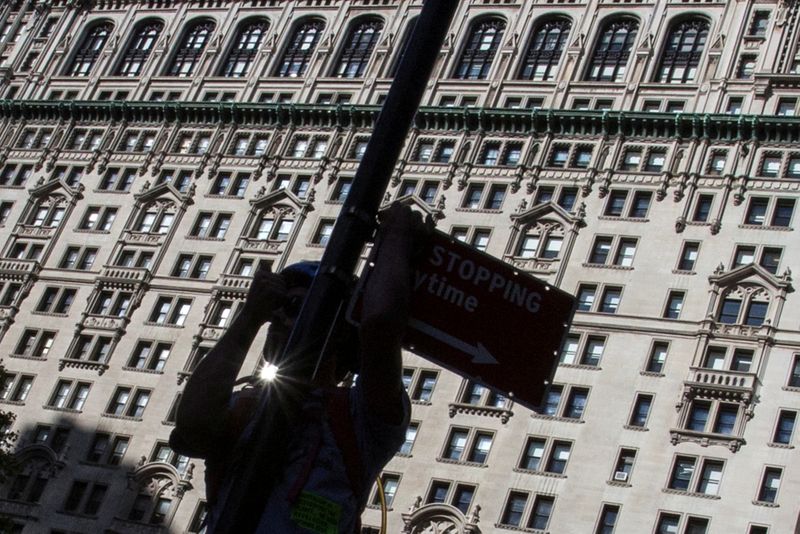By Geoffrey Smith
Investing.com -- Global markets are rattled by Omicron-variant Covid-19, as Europe imposes its first full lockdown in a year. Joe Biden's signature spending bill is in trouble after a key Senator refuses to back it. Stocks are set to open sharply lower on a combination of those factors. China tells the world it's still loosening monetary policy even as everyone else (except Turkey) tightens it. And oil tumbles as risk-off sentiment surges. Here's what you need to know in financial markets on Monday, 20th December.
1. Omicron rattles world markets
Fears of the Omicron variant of Covid-19 rattled world markets after various countries in Europe adopted restrictive measures to stop its spread.
The Euro Stoxx 50 fell 1.5% while national European stock markets fell as much as 4.9% (Copenhagen suffering from a 10% drop in Novo Nordisk (NYSE:NVO) stock due to problems with its anti-obesity drug). The euro ticked up against the dollar but Eurozone peripheral bond spreads widened.
Over the weekend, the Netherlands imposed a full lockdown of all non-essential shops until January 14th, while the U.K. hinted at introducing stricter measures this week. Germany effectively barred arrivals from the U.K., following similar measures by France last week.
In slightly better news, a study by U.K. scientists added to evidence that the very mutations that make Omicron more transmissible may also reduce its ability to damage the lungs, making it less dangerous than previous variants.
2. Manchin derails BBB
U.S. President Joe Biden’s $2 trillion Build Back Better bill is in jeopardy after West Virginia Senator Joe Manchin said he wouldn’t support the bill in its current form. That means that the bill can’t pass without Republican support in the Senate, which seems all but ruled out.
Failure to pass the bill would risk cementing perceptions of the Democratic caucus on Capitol Hill as too divided to rule effectively, hurting their prospects for the mid-term elections next year. By the same token, Opposition from Manchin – one of the most conservative of Democratic lawmakers - reflects on-the-ground suspicion of the party’s tax-and-spend agenda.
Goldman Sachs analysts cut their growth forecast for the U.S. economy next year in response to the news, saying it neutered a considerable fiscal stimulus impulse.
3. U.S. Stocks set to open lower as Covid infections hit a 3-month high
U.S. stocks are set to open the week sharply lower later on a combination of the Omicron and Manchin news.
By 6:20 AM ET (1120 GMT), Dow Jones futures were down 410 points, or 1.2%, while S&P 500 futures were down 1.3% and Nasdaq 100 futures were down 1.5%. All three indices had fallen on Friday, with the cyclical-heavy Dow underperforming.
The 7-day average for new Covid-19 infections hit its highest in nearly three months at the weekend, amid signs of Omicron exacerbating a seasonal spread that had already begun. That’s starting to show up in various data points such as restaurant reservations.
Stocks likely to be in focus include Moderna (NASDAQ:MRNA), which said trial data show that a booster shot of its Covid-19 vaccine sharply increases its effectiveness against Omicron, as well as Italian fashion group Zegna, which makes its debut on the NYSE.
4. China’s central bank sends a signal
China’s central bank cut its key interest rate by a token amount, in an effort to reassure local markets that it’s not going to get sucked into a global race to tighten monetary policy. It also hinted at a further easing next year.
The People’s Bank of China cut its prime rate by 5 basis points to 3.80%, the first time it has cut in nearly two years. However, such a small cut – to an instrument which is one of many that it uses to fine-tune monetary policy – is unlikely to have a material impact in its own right.
The move will still be welcomed by a real estate sector for which financing conditions have tightened sharply in recent weeks as capital markets have effectively closed to new debt issues from all but the safest developers. Kaisa, one of several developers now in default, earlier appointed Houlihan Lokey (NYSE:HLI) to advise it on a debt restructuring.
5, Oil tumbles despite Libya shutdown, CFTC data
Crude oil futures tumbled as Europe’s move to clamp down on mobility sparked fears of wider measures to kill demand from other countries. The chief risk in this regard comes from China’s zero-tolerance policy of Covid-19 and its readiness to swiftly impose lockdowns in response to even small and localized outbreaks.
By 6:35 AM ET, U.S. crude futures were down 3.5% at $68.36 a barrel, having earlier hit a two-week low. Brent futures were down 2.8% at $71.43 a barrel.
That was all despite news that Libya’s largest oil field has shut down, taking 284,000 barrels a day of output offline, barely a week before national elections due in the country. In addition, CFTC data on Friday showed that the pace of selling by speculative investors slowed substantially last week.
